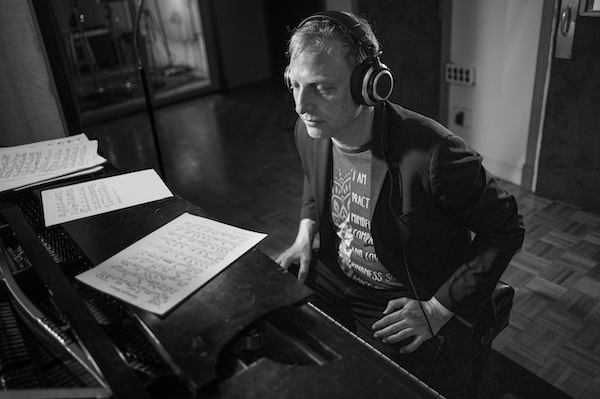Jan 13, 2026 2:09 PM
More Trump-Kennedy Center Cancellations
The fallout from the renaming of the John F. Kennedy Center for the Performing Arts to include President Donald…

Pianist Noah Haidu’s latest album, Doctone, features compositions by the late Kenny Kirkland.
(Photo: Isaac Rosenthal)Pianist Kenny Kirkland (1955–’98) left us far too soon, succumbing to congestive heart failure. The versatile musician was at home across a wide range of music, from Western classical to bayou funk. He recorded with dozens of musicians, including titans such as Michael Brecker, Dizzy Gillespie and John Scofield. In the ’80s and ’90s, Kirkland was an essential member of bands led by Sting, Wynton Marsalis and Branford Marsalis, but his only leader date was an eponymous disc released in 1991.
Several years ago, pianist Noah Haidu, 48, wanted to find a way to honor Kirkland’s legacy and unique compositional style. He had a few options: An album? A book? A documentary? Haidu’s answer was an all-encompassing “yes.” The result is the multimedia project Doctone, the title of which is a nod to Kirkland’s nickname. Drummer Billy Hart, who worked with Kirkland, anchors the Sunnyside album.
Growing up, Haidu was lucky enough to see Kirkland perform in several venues, from Los Angeles’ sprawling Greek Theatre to New York’s intimate Sweet Basil club. While earning his master’s degree, Haidu’s thesis focused exclusively on Kirkland.
Calling from his Brooklyn home, Haidu described the origin of his latest project: “We did the album in two days and we had enough breathing time to chat on sessions. Within a month or two of that recording, we were able to start interviewing people. The book [is a compilation of] the interviews. The documentary has excerpts from the book. I managed to do the book and the documentary in one fell swoop.”
While some artists might spend a lifetime producing a full-scale multimedia onslaught, Haidu managed to multitask all of these projects simultaneously, recording parts of the documentary during the pandemic. The brisk film, directed by Jeffrey Chuang, features Haidu’s interviews with Kirkland collaborators, including Sting, who whispers in a vulnerable, seemingly late-night Zoom chat, and drummer Jeff “Tain” Watts, who lounges under darkening skies. Saxophonist Steve Wilson lent his voice to not only the documentary but also to the album.
“Noah brings a great insight,” Wilson said. “He’s really done his homework. It’s been great to see him go beyond ‘I’ll just do a collection of Kenny Kirkland tunes.’ He really wanted to get inside Kirkland’s history and what inspired him and his roots.”
Doctone includes five tunes from Kirkland’s lone album, which featured Watts and Branford Marsalis, and bassist Christian McBride on one track—a roster of pugilistic Young Lions. Today, nearly 30 years after its release, Kirkland’s leader album is a seldom-referenced gem.
Haidu assembled a stellar rhythm section for his sessions, with bassist Todd Coolman joining Hart. Reedists Jon Irabagon and Gary Thomas contribute to a rendition of Kirkland’s “Fuchsia,” which appeared on Wynton Marsalis’ 1983 album Think Of One. Haidu sits in the pocket of respectful interpretation: He’s not trying to match Kirkland’s pounding technique, but rather highlight the flexibility of the compositions.
The accompanying book is a commuter train-friendly version of Chuang’s documentary. Transcriptions of extended interviews are mixed with reflections from pianist Jason Moran, family members and Kirkland collaborators, including guitarist Rodney Jones and trombonist Delfeayo Marsalis. It’s an easygoing read, focused squarely on its underappreciated subject. The entire Doctone project is a testament to Haidu’s passion and determination to uphold the tradition.
“I think Kenny had a special rhythmic and harmonic concept,” Haidu said. “I had to pick things for the album that were inspirational—that I wouldn’t have to play like Kenny—to make it work. These tunes are hard, but once you get into them, it was easy to find my sound on them.” DB
This story originally was published in the January 2021 issue of DownBeat. Subscribe here.

Belá Fleck during an interview with Fredrika Whitfield on CNN.
Jan 13, 2026 2:09 PM
The fallout from the renaming of the John F. Kennedy Center for the Performing Arts to include President Donald…

Peplowski first came to prominence in legacy swing bands, including the final iteration of the Benny Goodman Orchestra, before beginning a solo career in the late 1980s.
Feb 3, 2026 12:10 AM
Ken Peplowski, a clarinetist and tenor saxophonist who straddled the worlds of traditional and modern jazz, died Feb. 2…

The success of Oregon’s first album, 1971’s Music Of Another Present Era, allowed Towner to establish a solo career.
Jan 19, 2026 5:02 PM
Ralph Towner, a guitarist and composer who blended multiple genres, including jazz — and throughout them all remained…

Rico’s Anti-Microbial Instrument Swab
Jan 19, 2026 2:48 PM
With this year’s NAMM Show right around the corner, we can look forward to plenty of new and innovative instruments…

Richie Beirach was particularly renowned for his approach to chromatic harmony, which he used to improvise reharmonizations of originals and standards.
Jan 27, 2026 11:19 AM
Richie Beirach, a pianist and composer who channeled a knowledge of modern classical music into his jazz practice,…